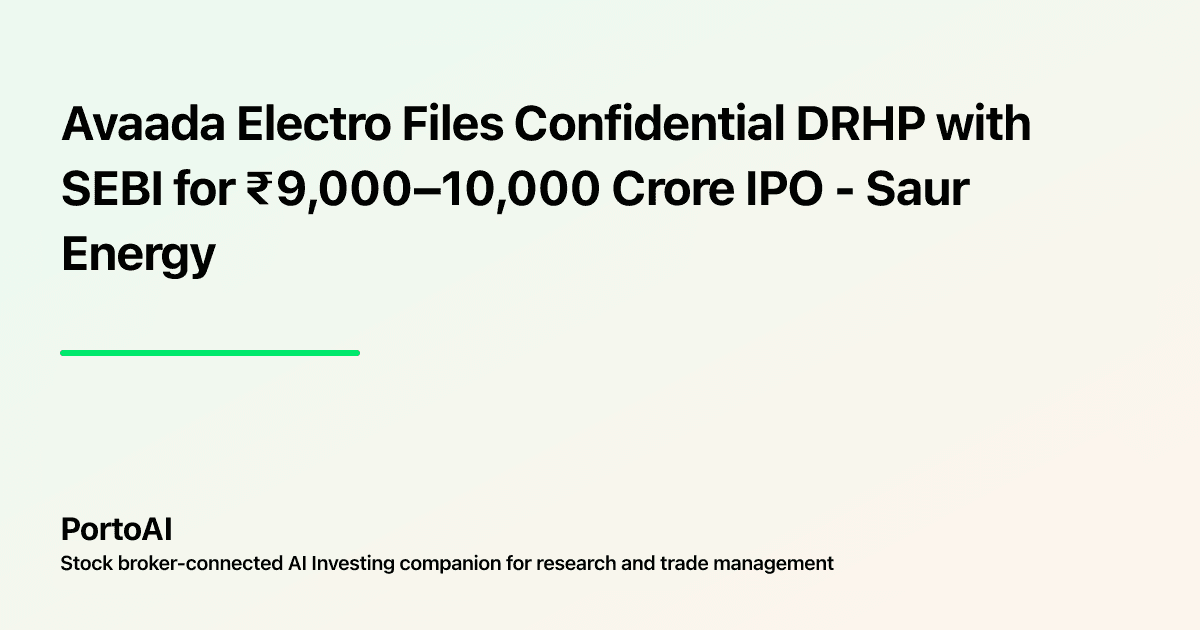AI Insights: Decoding Auto & FMCG Stock Potential This Festive Season

Venkateshwar Jambula
Lead Market Researcher
8 min read
•Published on September 28, 2024
•AI-Driven Analysis: Navigating Auto and FMCG Stocks for Festive Season Gains
As India's vibrant festive season approaches, a strategic analysis of the Automobile and Fast-Moving Consumer Goods (FMCG) sectors reveals compelling investment opportunities. Driven by anticipated shifts in consumer demand, macroeconomic tailwinds, and policy adjustments, these sectors present a nuanced landscape for discerning investors. This analysis, tailored for PortoAI users, focuses on consumer behavior dynamics, key economic drivers, and actionable data synthesis.
Macroeconomic Dynamics: Understanding Festive Season Inventory Trends
The Indian festive period, a cornerstone of the economic calendar, consistently stimulates consumption. Understanding the underlying mechanisms of this seasonal surge is crucial for identifying potential market movements.
The Historical Pattern of Festive Demand
Milestones such as Diwali, Dussehra, and Onam historically ignite a significant uplift in consumer spending. This period sees a proactive build-up of inventory across retail channels, driven by increased disposable incomes and a propensity for purchases ranging from essential goods to durables.
Inventory Surge as a Leading Indicator
Automobile manufacturers often calibrate production schedules to coincide with festivals, frequently introducing new models or promotional offers to capture heightened consumer interest. Concurrently, FMCG companies diligently stock both urban and rural distribution networks to meet anticipated demand for food, beverages, and personal care items. This inventory build-up is more than a logistical operation; it represents a strong signal of optimism regarding future sales and can act as a leading indicator for bullish stock price momentum.
Technical Analysis: Identifying Bullish Setups in Auto and FMCG Stocks
Recent policy adjustments and market sentiment provide a favorable backdrop for both the automotive and FMCG sectors. Analyzing these factors offers critical insights into potential stock performance.
Implications of GST and Tax Policy
Proposed reductions in the Goods and Services Tax (GST), such as a potential decrease on small cars from 28% to 18%, are poised to stimulate the auto sector, particularly the mid- and mass-market segments. Such adjustments, timed around key purchasing periods like Diwali, can significantly amplify sales volumes for automobile companies. Similarly, FMCG products and consumer durables may benefit from tax rationalization or cess removals, potentially lowering prices and boosting demand.
Market Reaction and Investor Sentiment
Market indicators have shown positive reactions to these potential policy shifts. For instance, the auto index has demonstrated rallies following reform proposals. Furthermore, a moderation in inflation estimates, as indicated by the Reserve Bank of India, suggests an increase in disposable income, which directly correlates with higher consumer spending and a positive sentiment for FMCG stocks.
Inventory Build-Up: A Technical Signal for Investors
From a technical perspective, an increase in company inventory levels often precedes stock price appreciation. Companies strategically build inventory to avoid stock-outs during peak demand periods. PortoAI's analytical models identify rising inventory as a key bullish technical factor, frequently correlating with improvements in operating margins and positive earnings surprises.
Sectoral Deep Dive: Fundamental and Technical Triggers
A closer examination of the automobile and FMCG industries reveals specific catalysts and risks.
Automobile Industry: Growth Catalysts and Risks
Growth Catalysts:
- GST Rate Adjustments: Lower taxes on specific vehicle categories can enhance affordability.
- New Launches & Festive Discounts: Original Equipment Manufacturers (OEMs) typically anticipate substantial sales increases during festive periods.
- Urban Demand Reversal: Policy adjustments may encourage cautious consumer spending in urban markets.
Risks:
- Supply Chain Disruptions: Ongoing challenges in semiconductor availability and logistics can impact production.
- Margin Pressure: Increased discounting or rising input costs can compress profit margins.
Key Technicals:
- Observe volume spikes, option open interest build-up, and gap-up openings as potential bullish signals.
- Technical traders should monitor for breakouts above established resistance levels.
FMCG Stocks: Macro and Micro Analysis
Growth Catalysts:
- Inflation Moderation: Lower Consumer Price Index (CPI) trends can improve urban purchasing power.
- Rural Channel Expansion: Policy rationalization can support distribution in rural areas.
- Seasonal Demand: Distributor and retailer stocking for Diwali aligns with peak consumer activity.
Risks:
- Competitive Landscape: Intense competition and potential price wars in urban retail environments.
- Past Underperformance: While current trends appear positive, historical performance may warrant consideration.
Critical Technical Factors:
- Look for resistance breakouts, strong Relative Strength Index (RSI) readings, and elevated delivery volumes.
- PortoAI's AI models synthesize news sentiment, social media trends, and sales data to refine stock recommendations.
Consumer Price Index (CPI) and Its Impact on Sector Performance
The CPI serves as a critical measure of aggregate inflation. A decline in CPI, observed in recent forecasts, directly enhances consumer purchasing power. Historically, while the FMCG sector can influence inflation, a falling CPI generally benefits FMCG companies by reducing the pressure on input costs and improving affordability for consumers. For the automobile industry, lower inflation translates to increased discretionary spending capacity for higher-ticket purchases.
Key Takeaways for Strategic Investors
The current market environment presents a confluence of favorable factors for both the automobile and FMCG sectors. Prudent inventory management, supportive consumer sentiment, and potential policy tailwinds create an optimistic outlook. Monitoring CPI trends remains essential, as stable or declining inflation generally expands consumer spending power.
Investment Opportunities: Key Stocks to Monitor
FMCG Companies: Major players such as Nestle, Emami, Godrej Consumer, HUL, Britannia, Dabur, Tata Consumer, Colgate-Palmolive, ITC, and Marico often exhibit strong performance during the festive season, especially following positive CPI and GST developments. Focus on technical indicators like delivery volume spikes and RSI trends.
Automobile Companies: Maruti Suzuki, Tata Motors, Mahindra & Mahindra, and Hero MotoCorp are anticipated beneficiaries of potential GST adjustments and festive promotions. Key metrics to track include inventory levels, price momentum, and chart patterns indicating breakouts.
How PortoAI Enhances Festive Season Investing
PortoAI empowers investors to navigate these seasonal opportunities with data-driven precision:
- Real-Time Signal Extraction: Our platform continuously monitors inventory data, policy news, macroeconomic indicators (like CPI), and technical chart patterns to generate actionable insights.
- Advanced Portfolio Strategies: Utilize PortoAI's features for automated rebalancing to align portfolios with pre-festive surges and employ sophisticated risk analytics to manage volatility during peak periods. Our sentiment analysis tools identify emerging positive news cycles and analyst consensus shifts.
- Backtesting & Predictive Analytics: PortoAI leverages historical data to backtest festive season rally patterns, optimizing entry and exit strategies. Our AI-driven approach provides personalized alerts and deep-dive sector analysis to identify potential outperformers.
Conclusion
The approaching festive season offers a dynamic backdrop for potential growth in the automobile and FMCG sectors. By integrating AI-powered insights, rigorous technical analysis, and real-time market signals, investors can make more confident and informed decisions. Whether focusing on long-term wealth creation or tactical short-term gains, PortoAI provides the tools to identify high-conviction opportunities and navigate market complexities. This festive season, empower your investment strategy with intelligent data.
Disclaimer: This content is for informational purposes only and does not constitute investment advice. Stock mentions are for illustrative purposes and not recommendations. Always conduct your own due diligence.
Frequently Asked Questions (FAQs)
Q1. Why is the inventory surge during the festive season significant for FMCG and automobile stocks?
A1. An inventory surge signals companies' anticipation of heightened demand. This proactive stocking often correlates with increased sales, potential margin improvements, and positive stock price movements, especially when supported by favorable policies like GST reductions.
Q2. How does the Consumer Price Index (CPI) influence the FMCG and automobile industries during festive periods?
A2. A lower CPI indicates decelerating inflation, which typically leads to increased disposable income and stimulates consumer spending on both everyday goods and larger purchases like vehicles. This volume increase and reduced cost pressure benefit companies, often resulting in stock rallies.
Q3. What technical indicators are valuable for analyzing festive rallies in auto and FMCG stocks?
A3. Key indicators include rising delivery volumes, chart patterns indicating breakouts, strong RSI readings (typically above 60), and build-ups in option open interest, particularly during periods of inventory accumulation. PortoAI integrates these signals into its recommendation engine.
Q4. How do GST rate changes uniquely impact the automobile industry versus FMCG companies?
A4. For the automobile industry, GST reductions can directly lead to lower consumer prices, driving significant volume increases and positive sentiment, especially during festive offers. While FMCG also benefits from input cost efficiencies, the auto sector often experiences a more pronounced impact on demand and sentiment due to the nature of the purchase and promotional timing.
Q5. What role does PortoAI play in assisting investors during the festive surge in auto and FMCG stocks?
A5. PortoAI leverages artificial intelligence to analyze real-time inventory data, market sentiment, CPI trends, and technical chart patterns. The platform provides automated portfolio adjustments, timely alerts, and personalized insights, enabling investors to capitalize on seasonal market movements with enhanced risk management.
Blog
Investment Insights and Tips
Explore our latest investment strategies and insights.

Stocks
Suzlon Energy Q2 FY26 Results: PAT soars 538% YoY to Rs 1,279 crore, highest in 30 years; revenue jumps 85%
Suzlon Energy, an Indian renewable energy solutions provider, reported a record-breaking performance for Q2 FY26, with consolidated Profit After Tax (PAT) surging 538% year-on-year to Rs 1,279 crore, marking its...
Venkateshwar Jambula
November 5, 2025
•4min

Stocks
Groww IPO set to open: Does valuation and GMP leave room for any listing gains?
Groww’s Rs 6,632 crore IPO, one of India's biggest fintech listings, is met with cautious optimism. While strong fundamentals and profitability are noted, a steep valuation and regulatory uncertainty could...
Venkateshwar Jambula
November 4, 2025
•5min

Stocks
Softbank-backed Meesho, Zomato-backed Shiprocket among 7 companies to get Sebi's approval for IPO launch
India's capital markets regulator, Sebi, has granted approval for the launch of Initial Public Offerings (IPOs) to seven companies, including prominent e-commerce players Meesho (Softbank-backed) and Shiprocket (Temasek-backed). These approvals...
Venkateshwar Jambula
November 4, 2025
•5min

Stocks
Avaada Electro Files Confidential DRHP with SEBI for ₹9,000–10,000 Crore IPO - Saur Energy
Note: Broker connections are subject to availability and your broker’s terms.
Venkateshwar Jambula
November 2, 2025
•6min